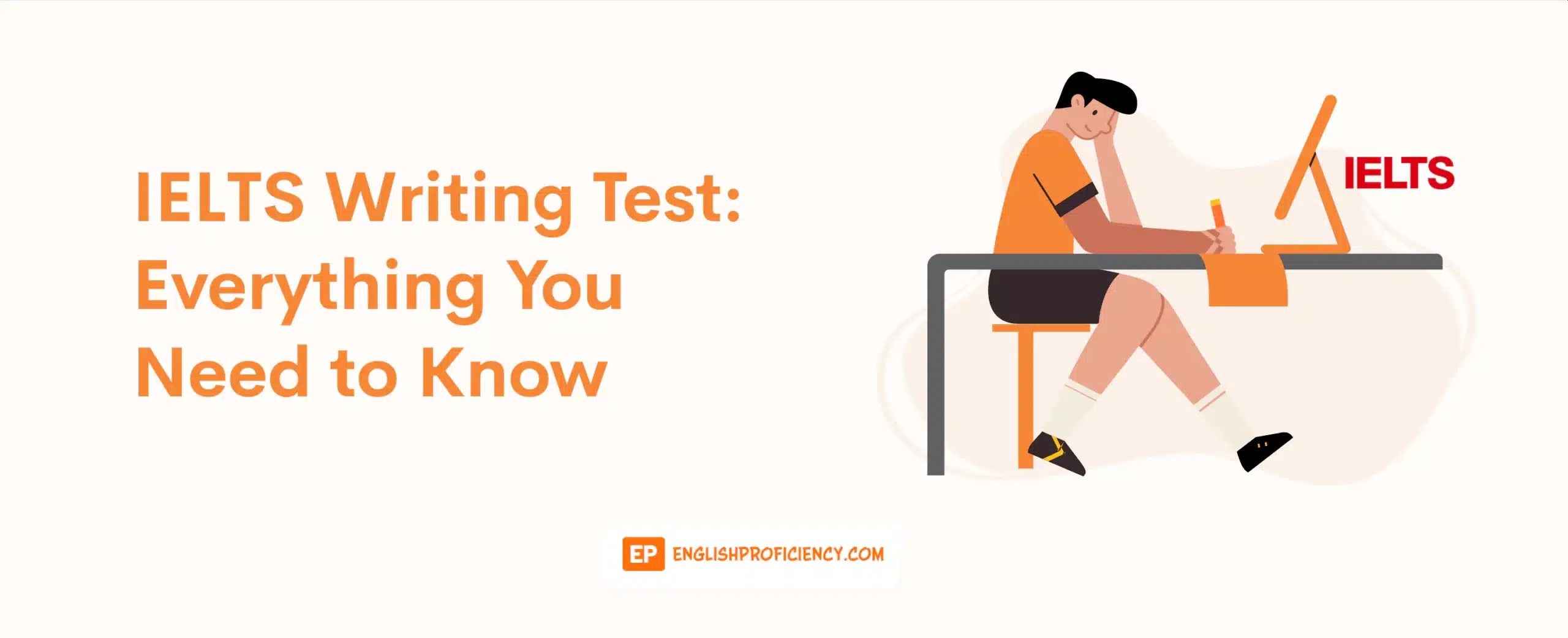The International English Language Testing System (IELTS) is a series of tests that can help you work, study, or migrate to countries where English is the primary language. Australia, Canada, New Zealand, the United Kingdom, and the United States are among these countries. Speaking, Reading, Listening, and Writing are the four sections of the IELTS Test.
It was introduced in 1989 and has since become one of the most trusted English-language assessments. It is accepted by over 8,000 universities, employers, and immigration bureaus worldwide. The four sections of IELTS mainly focus on the candidate’s practical ability to converse in English in real-life situations.
The IELTS Writing Test is arguably the most challenging section in the IELTS exam. Time and again, there have been candidates who have fared well in the other three tests – Speaking, Listening, and Reading, but did not do so well in the IELTS Writing Test. This is also the test where most candidates got their lowest band score.
That alone speaks for how difficult the IELTS Writing Test could be. Through this article, we will make it easier and simpler for you by providing you with the most important information there is to know about the IELTS Writing Test so you can ace it effortlessly.
- What You Should Know About IELTS Academic Writing?
- What You Should Know About IELTS General Training Writing?
- How is the Writing Band Score Calculated?
- Sample IELTS Writing Responses
- General Tips to Improve Your English Writing Skills
- Proven and Practical Strategies to Improve Your Grade on IELTS Writing
- How to Prepare for the IELTS Writing Test?
- Additional FAQs on the IELTS Writing Test
What You Should Know About IELTS Academic Writing?
The IELTS Writing Test takes an hour to complete. It has two tasks, both of which should be completed. You should allow no more than 20 minutes in the first task because the second task has more weight.
The topics in the IELTS Academic Writing Test are of general interest and are appropriate for students starting undergraduate and postgraduate degrees and those seeking professional registration.
Task 1
Task 1 of the IELTS Academic Writing Test involves explaining how something functions or is done using a graph (bar, line, or pie graph), table, or diagram. At least 150 words are required.
Task 1 of the IELTS Academic Writing Task assesses your ability to:
- select and report the most significant parts
- describe and compare facts
- identify significance and trends in factual data
- describe a process
Here are the different question types that will appear in the IELTS Academic Writing Test Task 1.
Bar, Line, and Pie Graph
You will be presented with either a bar, line, or pie graph. You are required to describe and explain the data in the graph.
Example 1:
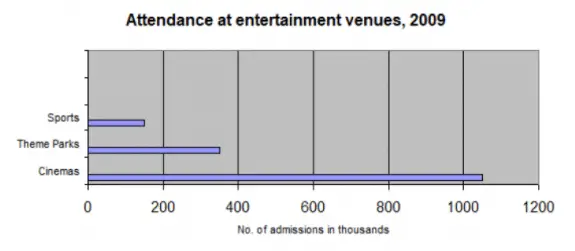
Example 2:

Example 3:

Table
You will be presented with a table, and you need to explain the data based on the given table.
Example:
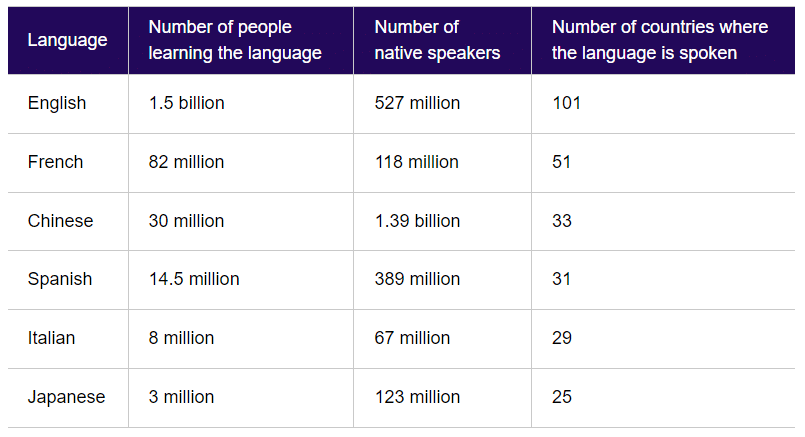
Map
You will be presented with a map, and you need to explain the data based on the given map.
Example:
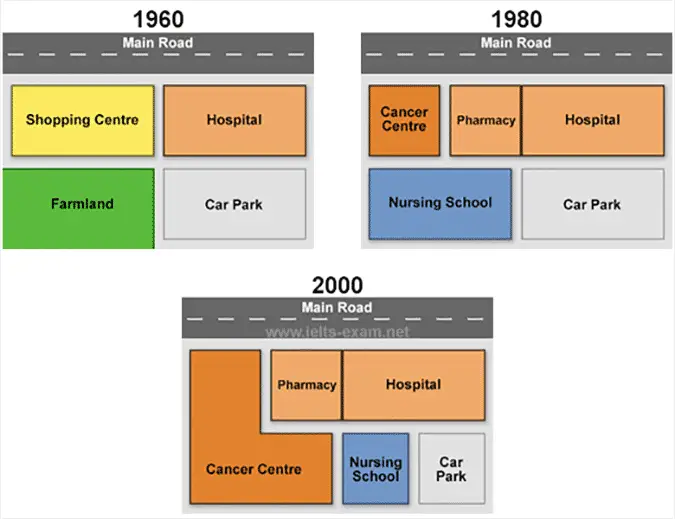
Diagram
You will be presented with a diagram of a process, and you need to explain the data based on the given diagram.
Example:

Task 2
The IELTS Academic Writing Test Task 2 requires you to write an essay in response to a point of view, argument, or problem. Your essay must be at least 250 words long.
Task 2 of the IELTS Academic Writing Test assesses your ability to:
- give and justify your opinion
- present a clear, relevant, and well-structured argument
- support concepts with evidence or examples
- suggest alternative solutions
- use accurate language
Example 1:
Children brought up in low-income families tend to be more successful in dealing with problems. To what extent do you agree?
Cite reasons and give your opinions. Cite any relevant examples from your knowledge or experience.
Example 2:
Many students prefer to travel or obtain work experience during their gap year before beginning university.
Is this a decent idea or a waste of time for you?
Discuss and give your opinions on both viewpoints. Cite reasons for your response and provide any relevant examples from your own knowledge or experience.
What You Should Know About IELTS General Training Writing?
The topics in the IELTS Academic Writing Test are of general interest and are appropriate for students starting undergraduate and postgraduate degrees and those seeking professional registration.
Task 1
The first task in IELTS General Writing Test entails you to take action to a situation by composing a letter asking for information or seeking an explanation. You should have at least 150 words in your letter.
Task 1 of the IELTS General Training Task 1 assesses your ability to:
- engage in personal correspondence
- elicit and convey basic facts
- express the things needed and wanted
- express points of view and personal perspectives
Example 1:
You found out that a shopping center is planned to be built in your neighborhood.
Write a letter to the council. In your letter,
- explain how you learned about the plan
- describe and explain how you feel about it
- enquire about it and get more information
Example 2:
While you are away on vacation, a friend has agreed to look after your home and pet.
Write your friend a note. In your letter,
- provide contact information for when you are away
- explain instructions on how to care for your pet
- cite household responsibilities
Task 2
On the other hand, Task 2 of the IELTS Writing Test requires you to respond to a perspective, problem, or argument with an essay. You should have at least 250 words in your essay.
The second task of the IELTS General Writing Test measures your ability to:
- give and justify your opinion
- present a clear, relevant, and well-structured argument
- support concepts with evidence or examples
- suggest alternative solutions
- use accurate language
Example 1:
Some people believe that homeschooling is the best method to help kids grow, while others believe that kids should go to school.
To what extent do you agree?
Cite reasons for your answer. Cite any relevant examples from your own knowledge or experience.
Example 2:
In many nations nowadays, experience is regarded more than knowledge in work.
Do you believe the benefits outweigh the disadvantages?
Cite reasons for your answer and give any relevant examples from your own knowledge or experience.
How is the Writing Band Score Calculated?
The IELTS Writing Test appraises your ability to express yourself in written English, where the examiner assigns band scores that range from 1-9.
It is rated in four categories and examined by licensed and professional examiners. After being recognized by the British Council, IDP, and IELTS Australia. All IELTS test examiners will have some teaching experience and be hired by test centers.
To know more about how the IELTS Writing Test is marked, please click here: IELTS Writing Scoring.
Sample IELTS Writing Responses
Familiarizing yourself with previous and model answers from past IELTS papers will also help you understand what writing techniques and strategies to employ as you get yourself ready for the IELTS Writing Test.
Below are sample responses of the IELTS Writing Test in the previous years:
IELTS Writing Academic Task 1
Example 1:
Task/Question:
Bar line/Graph (see below)
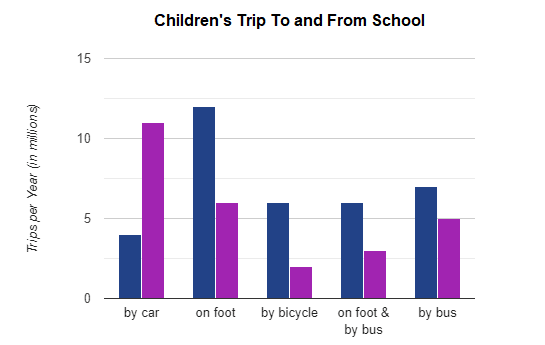
Sample Response to the Question/Task:
"The graph shows how children got to and from school between 1990 and 2010. Car, walking, bicycle, walking, bus, and bus were exclusively the modes of transportation. The number of youngsters who traveled by car grew from 1990 to 2010, a noticeable characteristic of this graph. Walking was the means of transport for most children's travels in 1990. However, by 2010, the number of journeys per year had dropped to as low as 6 million. In 1990, approximately 6 million students rode their bikes, walked, or took the bus to school. However, in 2010, the number of bike trips to school fell to 2 million, while walking and bus journeys fell to around 3 million. The number of bus journeys to school hasn't changed significantly. It was roughly 7 million in 1990 and approximately 5 million in 2010. In 1990, the number of children who drove to and from school was much lower than that of children who walked. In 2010, however, the number of children who drove to school grew while the number of children who walked to school fell. In 2010, youngsters rode the bus to school more than they rode their bikes to school."
Response Assessment:
- Word count == 205 words
- Band score == 6.5
Our Feedback on the Sample Response:
The major aspects are completely covered. However, the reporting is a little mechanical, and only part of the descriptions are backed up with statistics. A summary is also missing from the response. Although the information and concepts are primarily organized logically, this is lost at the end of the response.
Cohesive devices are effectively deployed, and there is a clear overall progression. The vocabulary variety is enough and appropriate, and the spelling is correct, but there isn’t enough flexibility or usage of less frequent language to warrant a higher band. There is a good combination of simple and complicated sentence structures employed correctly, but there isn’t enough variety of structures to get a higher band.
Example 2:
Sample Response to the Question/Task:
"The figures depict the number of trips taken by students in one country over the course of several years to get to and from school using various means of transportation. Children who walk (13 million) are by far the most numerous, while children who take the bus (7 million) are slightly more numerous than children who drive in 1990. However, in 2010, the number of children who drove a car (11 million) was significantly higher than the number of children who took the bus (5 million). In 2010, contrarily, the number of children walking (6 million) was twice as high as the number of children cycling (3 million). Overall, there were 12,000,000 children walking in 1990, 11,000,000 children using care in 2010, and 5,000,000 children taking the bus at the end of the period"
Response Assessment:
- Word count == 135 words
- Band score == 3.5
Our Feedback on the Sample Response:
The candidate attempts to complete the work, but not all of the main characteristics are addressed (the ‘walking and bus’ category is not mentioned). In addition, the reaction is noticeably short. These flaws have an impact on the Task Achievement rating.
The information is delivered, but the organization is difficult to discern, and the reaction lacks a defined progression. Some coherent devices exist, but they are not usually employed correctly.
The vocabulary is inadequate and has the tendency to be used frequently. There isn’t a lot of control over spelling, and there are a lot of mistakes. There is a limited number of sentence forms available, and while some structures are formed correctly, errors are common.
IELTS Writing Academic Task 2
Example 1:
Topic/Question:
Many parents today provide their children with daily access to laptops, tablets, and/or cellphones. Some argue that the amount of time spent in front of the screen should be restricted.
Discuss and give your opinions on both views.
Sample Response to the Question/Task:
Smartphones have become indispensable in our daily lives. And these days, a PC or a portable computer, such as a tablet, is a common gadget in schools. "These gadgets are fantastic." Some mothers and fathers would disagree. One of the main reasons parents enjoys it is because it causes children to become quiet when they use it. The majority of children play video games. Now since games are more innovative, children enjoy them. Parents can focus on their work while their children are engrossed in devices. However, there have been several recent unsatisfactory studies. They discovered an unintended consequence of using screen devices. Experts warn us about allowing children to use devices without supervision. The findings of the study mainly revealed two things. The first type is cybercrime. Unfortunately, young children are quickly drawn to criminal activity via the Internet. Addiction is the second issue. Addiction causes a breakdown in communication. Attachment and love can only come from parents or other caregivers and direct eye-to-eye connections between people. Even while the game on the screen emphasizes communication and socialization, it is insufficient. We live in a technological world where we cannot close our eyes or turn our backs on what used to be. However, we may securely use these devices. I'd like to establish two ground rules. My son enjoys playing games on his tablet. We talked about it and decided on a time limit. He is only allowed to play for thirty minutes per day and not at night. Another rule is that you must be in a specific location. In his bedroom, I don't allow him to use iPads. He plays in the same room as me, similar to a living room. If we ponder before turning it on, we can live happily with a "digital magical notebook."
Response Assessment:
- Word count == 308 words
- Band score == 6.5
Our Feedback on the Sample Response:
Some colloquial terms are used, such as “kids.” All words should be formal and scholarly. Simple terms like “unhappy” are used. Advanced terminology, such as “ominous,” should be employed. Repetition of vocabulary words, such as “rule.” More paraphrasing is required.
Example 2:
Task/Question:
When children are physically disciplined or rewarded, they behave better.
To what extent do you agree?
Sample Response to the Question/Task:
"Children are the nation's future, and raising them is a contentious matter. Some people believe they should be subjected to physical punishment, while others need regular praise. These arguments, in my opinion, need to be thoroughly examined before forming a judgment. To begin with, there are numerous benefits to giving prizes to children. For starters, verbal praise and appreciation may have a magical effect on children's behavior. When praised for good behavior, they learn the value of good behavior and strive to maintain it. The better comments they receive, the more confident they become. Children who are subjected to physical punishment, on the other hand, are perceived as lacking in self-confidence. According to a survey of children's behavior, a child who has been subjected to punitive acts by his parents is more violent and enraged than other children his age. As a result, hitting a youngster is never productive. In contrast, there is no doubt that educating the infamous and savage mentality is a difficult nut to crack, because the rod is the only reasoning for fools. Furthermore, some children continue to make mistakes despite being warned and punished; this form of defiance forces parents and guardians to beat them. Over-pampering may be harmful to children. In the current situation, parents have one or two children, and this pampering serves to divert their attention away from their goals. To summarize, children are sensitive buds, and caring for them is a huge duty. As a result, proper raising necessitates a fair assessment of behavior."
Response Assessment:
- Word count == 265 words
- Band score == 7.5
Our Feedback on the Sample Response:
From the start, a clear perspective is offered and backed up by relevant ideas—the information and ideas are generally well-organized, with a clear overall trend. The employment of cohesive devices is booming. It is evident too that the candidate has a wide range of vocabulary and knows grammar rules.
The writing style is excellent, and the voice is appropriate. A firm conclusion is made and made for a high band score.
IELTS Writing General Training Task 1
Example 1:
Task/Question:
You share your accommodation with another roommate, and you wish to be transferred somewhere else because his ways distract your studies. In your letter,
- describe the situation you are in
- explain how you feel about the situation
- explain what action you need to be done and why
Sample Response to the Question/Task:
Dear Sir or Madam, I am writing to express my displeasure with my roommate in my current accommodation and request another room next term. My ultimate problem is that I haven’t been able to study properly in my room because my roommate always has a lot of visitors. Most of the time, they are very noisy, which distracts me from studying. He also usually has parties which usually end early in the morning, several times a week. Several people have been disturbed by this, not just me. Furthermore, he frequently borrows my belongings without my permission. He has also failed to return the things that he has borrowed from me at times. I can no longer accept this condition, mainly because I have several critical tests coming up next term to study diligently. This is why I would be so glad if I could be moved to a different room next semester. It would be best for me if I did not have to share my room with anyone else. I anticipate hearing from you shortly.
Response Assessment:
- Word count == 182 words
- Band score == 7.0
Our Feedback on the Sample Response:
Candidates can contribute their thoughts in their replies, even if ideas are often supplied in the job rubric. The candidate has sought to integrate some original content in this case.
The answer reads smoothly, is well-organized, and uses conjunctions to connect points effectively. Although there are some grammatical faults, they do not significantly impact the reader, and there is an indication of more sophisticated sentence patterns.
Example 2:
Task/Question:
You have been using the library resources for a long time and enjoy the services it offers. However, the past few years saw a decline in the number of books purchased and lent to users. In your letter,
- describe how you feel about the library services
- Share your concerns and explain why
- explain what solutions you think would work
Sample Response to the Question/Task:
Dear Sir or Madam, I am writing to share my opinions about library services and send some suggestions on improving your services. I have been using your library services for twenty-five years, and even my son has started to use them as well. I enjoy the library staff’s attentiveness and how they serve the library users. They are always polite, friendly, and easily find what you want to borrow. The library is equipped with comfortable furniture ,which helps users feel freely and work efficiently. You also have the reading room with the daily newspapers, magazines, and other informative resources. I really appreciate all the above mentioned things in your library. However, I do have quite a few concerns I would like to share with you. The thing is I cannot find anymore the recent edition books or books of authors of the current century. Of course I understand we can always find them in the bookstores or on the Internet, but everybody will agree with me that there is a great pleasure to read a book alive instead of reading it on a computer or other resources. It would be nice if you could update your collections. I understand it would be costly but maybe saving your time to buy a computer and load the database of your collection of books. That is all I would like to share with you.
Response Assessment:
- Word count == 237 words
- Band score == 6.5
Our Feedback on the Sample Response:
The letter’s purpose is stated clearly, and each of the three bullet points is underlined and explored. The final bullet and the letter’s closing sentence, on the other hand, may be expanded more extensively or more properly. The material is presented clearly throughout, with some errors, and coherent devices, references, and substitutes are employed flexibly.
The lack of paragraphs prohibits this criterion from receiving a higher band. There is evidence that the test taker can utilize less common expressions and is aware of collocation. The candidate has a wide range of vocabulary that is employed with some freedom.
There are a few instances where the word form and choice are incorrect. Despite the fact that there is a mix of simple and sophisticated sentences, the level and consistency of errors in articles, prepositions, and some verb phrases limit the grade for this criterion. The number of grammatical errors precludes this response from fully matching the higher band’s characteristics.
IELTS Writing General Training Task 2
Example 1:
Task/Question:
Some people believe that in their spare time, teens should be compelled to perform unpaid community service. This is beneficial to both teenagers and the community.
How much do you agree or disagree?
Sample Response to the Question/Task:
Every country's backbone is its youth. As a result, some people believe that young people should be encouraged to engage in social work since it will lead to a flourishing society and individualistic growth in the youth. I agree that the benefits of this incentive outweigh the disadvantages. To begin with, children's social work can readily be linked to development of their personality because during this time, they have the tendency to communicate with a variety of people, which leads to improved language skills. For example, if they are trying to persuade rural parents to send their children to school, they must have a persuasive mindset as well as strong language abilities to deal with a variety of people. This enhanced ability will benefit them in many aspects of their lives. Aside from that, actual life virtues such as tolerance, patience, teamwork, and cooperation can be taught. Furthermore, young minds serve the country with zeal, resulting in a sense of fulfillment and self-satisfaction. This self-worth instills in them a sense of self-assurance and patriotism. Furthermore, traveling and seeing different cultures and traditions broadens their horizons and adds another feather to their cap. However, no rose is complete without thorns, as the saying goes. Can the disadvantages of this procedure be overlooked? Children attend school, participate in many curriculum activities, face peer, parent, and teacher pressure, and in today's competitive environment, they should not be expected to serve society without receiving monetary compensation. This type of stress may cause resentment in their minds. To summarize, I believe that the idea of a teenager doing unpaid work is a good one, but that sufficient supervision and care should be provided to avoid negative repercussions.
Response Assessment:
- Word count == 282 words
- Band score == 7.0
Our Feedback on the Sample Response:
The candidate presented the argument in a structured and organized manner. A wide range of sophisticated lexis is evident and employed to convey meaning precisely, however, there are certain errors in word choice that result in some slightly odd statements.
A wide range of structures are also utilized fluently, and the majority of sentences are structured well. Despite the excellent level of linguistic competency, the format and organization problems in this 7-band score limit the marks.
Example 2:
Task/Question:
Some believe that art is an important subject for children to learn in school, while there are those who believe that it is a waste of time.
Discuss both views and give your opinions.
Sample Response to the Question/Task:
There has always been a heated argument about whether art is a vital subject for children to learn in school or if it may be overlooked in favor of other important disciplines. In the succeeding paragraphs, I will explain both viewpoints before forming an opinion at the end. To start with, there are various reasons to support other vital courses in children's school curriculum; for example, current technology, such as computer literacy, has become a need. It is one of the most highly-sought abilities in any industry. If they devote the majority of their time to mastering art, they will be unable to compete in this scenario's cutthroat competitions. Furthermore, essential understanding of areas such as math and physics is required in every field. Second, while art is highly valued, it does not guarantee career advancement because most sectors such as engineering, marketing, IT experts, and management require graduates and postgraduates in these key areas. On the other hand, art is a creative skill that allows for a great deal of creativity. It gives wings to the imagination and expresses feelings without the use of words. To illustrate, I once came across a painting in which the disparity between the plights of the rich and poor was conveyed solely through art. Furthermore, music is an art form that may be used as a kind of stress relief in today's hurried society. Second, artists bring honor to the country around the world and ensure that the country's cultural legacy does not perish. For their work, they are generously compensated and praised. A successful career is equated to this level of admiration. To sum up, I believe that subject selection should be left to the students who are interested in them because that interest helps them progress in their lives.
Response Assessment:
- Word count == 299 words
- Band score == 7.0
Our Feedback on the Sample Response:
The candidate establishes a definite perspective right away and explores some ideas to back it up. A different viewpoint is also examined, but it is rejected. It has a strong response, but technology is overemphasized. With appropriate use of cohesive devices and logical paragraphing, ideas are organized rationally and there is a clear development throughout the response.
Breaking down paragraphs 2 and 3 could possibly improve the response. There is a diverse vocabulary with good usage of uncommon things and signs of higher-level qualities like ‘wings to the imagination. Spelling and word-formation mistakes are uncommon. There are also a variety of complicated structures with numerous error-free sentences. However, occasional errors do occur, and some sentence patterns are overused.
General Tips to Improve Your English Writing Skills
The IELTS Writing Test is designed to put your writing skills to the test. As such, you should exert a great effort to improve your writing skills before taking the IELTS Writing Test.
Here are the ways on how you can improve your IELTS Writing skills:
- Refresh your knowledge of the fundamentals: You need at least an intermediate mastery of the basic principles of writing before you can start creating amazing material. This does not mean that you must enroll in a prominent creative writing school, but it does imply that you must be familiar with the fundamentals of grammar and spelling. Have a copy of the most thorough publications about the proper use of grammar and other useful topics.
- Write as if it is your job: You must practice if you want to improve at something, and writing is no exception! If you want your writing skills to be improved, writing daily will help you overcome your dread of the blank page and assist you in developing your style. To continue writing, even if no one reads it. It is said that practice makes perfect.
- Read as if it is your job: The best writers are also ardent readers. Reading daily is a simple approach to begin honing your writing abilities. Diversify your reading material, and we do not just mean blog postings. Expand your horizons by reading more difficult content, and pay attention to sentence structure, word choice, and the flow of the information.
- Pick your words carefully: A sentence can be written in various ways, and multiple words can be used to communicate the same meaning. Always go for words that will make your work more coherent and cohesive. Sometimes, simple words are more direct and easier to understand for all readers instead of complex words. Consult a thesaurus if you require assistance finding a replacement or a more straightforward way to say things.
- Use a genuine, conversational tone in your writing: Your distinct voice defines your writing style. Write in a manner that feels natural to you. To put it another way, write as if you were conversing. Shape ideas with your own unique views and voice and avoid clichés as much as possible. Your style of writing should represent your personality.
- Use the active voice wherever possible: Stick to the subject-verb-object sentence structure and use the active voice. It is the quickest way to get your argument across. The active voice involves the subject doing something more thrilling than the passive form, which involves the subject being done to. The passive voice is grammatically correct. However, it produces long, complex words and is a less effective way of communicating information.
- Make sure you understand the concepts you are discussing: “If you can’t explain it to a six-year-old, you don’t comprehend it yourself,” Albert Einstein once stated. Take time to mentally explain the notion to the six-year-old who lives inside your skull before you begin writing. If you want to attain a specific outcome with your writing, consider that result. Have a strong idea in mind before you start writing. Then stay with it.
- Do not go overboard with your explanations: Keep things simple. Take the effort to organize your thoughts ahead of time. The goal is to provide readers with just enough information to understand what you are saying without overwhelming them with unnecessary information. If you are being bogged down in unimportant details, consider whether each piece of information is necessary to help your reader understand your point. Otherwise, get rid of it.
Additional Reading — Improve Your Overall English Skills
Proven and Practical Strategies to Improve Your Grade on IELTS Writing
To equip yourself better with the knowledge and skills for your IELTS Writing Test, you must employ different strategies and techniques that will help you ace this part of the test.
Here are some of them:
- Gather feedback and comments on your work: You might contact someone who has already completed the exam and received a good grade, or you could seek assistance from a teacher or acquaintance who is fluent in English or is a native speaker. The goal is to determine your strengths and flaws, not wow the reader. The difficulty becomes easier once you understand which elements of your writing talents demand the most attention.
- Write every day: Months before the IELTS test, we strongly advise that you write as much as possible. Do not be concerned if you have any decent topics to write about. You do not need to be a genius. It is more than enough to transcribe your everyday activities into words at the end of the day. If you practice this consistently while receiving feedback on your work, you will notice an improvement in your writing skills within a few weeks.
- Practice and employ transitional devices in your writing: Once you have mastered the fundamentals of writing, keep working on them. One method is to use transitional devices, also known as connectives. You might need to hop from one concept to the next when writing. Transitional devices ensure a steady flow of information without confusing the reader. Transitional devices can be a single word such as ‘meanwhile,’ ‘hereafter,’ ‘hence,’ a sentence, or even a paragraph. However, given the test’s word limit, connecting sections of your content with mere words or short sentences are best.
- Prepare ahead of time: You must have a plan to prepare for the IELTS Writing Test. You can practice writing utilizing a variety of free online practice tools. If you require additional assistance, hire an instructor who will tell you where you are doing wrong and what you need to work on. As much as possible, prepare for the test. There is no such thing as overpreparation.
- Improve your grammatical range and vocabulary: Spend time reading different materials, such as commercials, articles, manuals, magazines, reports, and sample models from practice exams, in the weeks leading up to your IELTS test day to learn new vocabulary in varied situations. Practice making sentences with new words and difficult structures.
How to Prepare for the IELTS Writing Test?
Knowing what to expect when you take the IELTS Writing Test will surely give you an advantage to eventually get the band score you aim for. This will provide you with the confidence you need not panic and maximize your time.
Here are some tips on how to give your best performance in the IELTS Writing Test:
Before the Test
- Give yourself a day off: This is the time to relax, unwind, and sleep. We are confident that you have worked hard to study and prepare. Take a walk in the park or to the beach. Relax and calm yourself by doing things you enjoy. On the test day, you must be in the appropriate state of mind.
- Prepare everything you’ll need ahead of time: You will need your ID on the day of the test. This ID must match the one you used when you registered. Bring pencils, erasers, and a water bottle with you if you get thirsty throughout the test.
- Find out where the testing center is located: Days before the test, make sure you know where the testing center is. Before you go, look up its exact location on Google and learn about the traffic patterns in the area. Make sure everything is in working order. BE ON TIME.
During the Test
- Understand the task: Make it a point that you understand exactly what the question asks you to do, whether it is for the IELTS Academic and IELTS General Training, Task 1 and Task 2. Be sure you know the appropriate register (formal or casual) and salutations and closings if you are writing a letter. Make sure you can identify both sides of an issue if you write an opinion essay.
- Draft an outline: You should consider creating an outline before you begin writing. Candidates frequently argue that they should not waste valuable minutes creating an outline because the test is timed. This is not true at all! An outline will save you time by ensuring that you stay focused when writing and do not stray from the topic. Before you begin writing, an outline will help you organize your thoughts and put them in the best order possible. Above all, having a decent outline allows you to concentrate on the language you are using (vocabulary and sentence structure) rather than the concepts you’ll communicate.
- Keep your idea simple: It is essential to note that the IELTS Writing Tests do not measure your knowledge of the subject or your intelligence. They evaluate your ability to communicate concepts in English clearly and coherently. Order your paragraphs and phrases to present one thought per sentence and one governing idea per paragraph. Support your arguments with evidence with an example or explanation, then tie the evidence back to your main topic at the end of the paragraph.
- Concentrate on the language rather than the length: Although you must aim for the required word count in the IELTS Writing Test. Your essay does not have to be that long. As long as you meet the required number of words, you will be fine. You get marks for correctly and organically employing complicated sentence structure and powerful vocabulary. Rather than being concerned about the length of your essay, focus on including interesting vocabulary and avoiding repetition. You should work on expanding your vocabulary for a variety of themes as you prepare for the IELTS exam. This will assist you in coming up with synonyms to employ in your writing.
- Proofread: This can be difficult for timed tests such as the IELTS Writing Test. However, it is critical to set aside a few minutes after each writing activity to proofread. You should look for minor spelling and grammar errors. This is not the moment to decide that your argument is weak and draft a fresh paragraph, and this is what your outline is for. Read your essay to ensure that it is well-organized, and if necessary, add sentences or phrases to strengthen connections between concepts.
After the Test
- Relax: By this time, you have exerted every effort you could, and the best thing you can do now is to stay positive and take a break. Relax to take your mind off the preparations and hard work you have put in.
- Take a positive attitude about the outcome: Accept the outcome with a good attitude. It is fine if you do not get the band score you wanted. You may take it once more whenever you are ready. You would already be aware of your flaws by then, and you would be able to work on them.
For a thorough and comprehensive guide on how to prepare for the entire IELTS test, check out our comprehensive IELTS preparation guide.
Additional FAQs on the IELTS Writing Test
Is It Okay to Write More than 150 (Task 1) and 250 (Task 2) Words in The IELTS Writing Test?
Yes, it is okay to write more than the number of words required. Do not write less than the number of words needed, as you will be penalized and deducted marks. However, note that writing more than what is required does not mean higher marks. It is the content that matters, after all. For that reason, you should stop writing when you have reached the limit AND written a satisfactory conclusion.
Should I Express my Opinions in the Introduction of IELTS Writing Test Task 2?
First, carefully read the question. If the question just asks you to agree or disagree, you should explain your position in the beginning. If the question asks you to discuss both sides of an issue, keep your viewpoint for last. If the question includes a phrase like ‘To what extent’ or ‘How far,’ you can choose to start with a strong opinion or start with a more balanced approach and then present your ultimate conclusion later.
Is a 7 in the IELTS Writing Test Good?
Yes, a 7-band score in the IELTS Writing Test is good enough. As mentioned earlier, some candidates who have aced the three other tests: Speaking, Listening, and Reading, still did not fare so well in the IELTS Writing Test and still got a band score lower than 7. In most cases, this is also the part of the test where most candidates get their lowest band score. So if you get a band score of 7 (or higher) in the IELTS Writing Test, be proud as it is indeed a good score.
How Can I Get a 9 in the IELTS Writing Test?
Getting a band score of 9 in the IELTS Writing Test may be challenging, but it is not impossible. All you have to do is prepare and practice as much as you can and as often as possible before taking the test. Equip yourself with the most effective and valuable materials and resources. Seek help and advice from experts and people you may know who can help you get a 9 band score in the IELTS Writing Test.
Additional Resources for IELTS Writing Section
The IELTS Writing Test is arguably the most challenging of the IELTS Test. Thus, you should utilize the best and most effective materials and resources there are. Ensure that they will indeed help you as you prepare for the test.
We have gathered some of the best and most helpful resources you can use to prepare for the IELTS Writing Test. Here they are:
IELTS Writing Books
- Barron’s Writing for the IELTS
- IELTS Writing 9.0 Proficiency
- Collins English Writing for IELTS
- IELTS Writing Task 1 & 2: The Ultimate Guide
